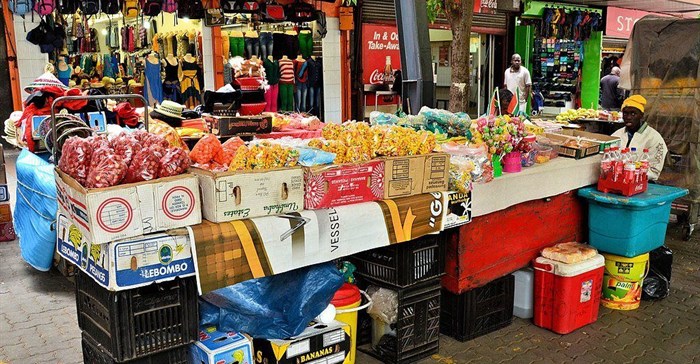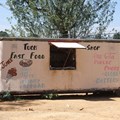
Ossewa, CC BY-SA 4.0 , via Wikimedia Commons
Last year, Nedbank, in partnership with Synthesis, Mastercard and Visa, released the first tap-on-phone technology in Africa, allowing anyone with a compatible handset to convert their phone into a payment acceptance device. For this segment of merchants, who are processing a low number of transactions, separate point of sale (POS) devices will no longer be required to accept card payments.
This will eliminate barriers, particularly those in the informal sector and it will drive innovation in the retail industry. But is the informal sector ready for this innovation and is Africa ready to go cashless?
To understand if the informal sector is ready to adopt this innovation, certain myths need to shattered. These myths prevent us from clearly seeing the sector and its possibilities.
Myth 1: The informal sector is a spaza sector
A common misperception is that the informal sector consists only of spaza shops, yet there is so much more to it than that. It is growing and diverse and because of this, people do not necessarily seek to leave it.
“There's this kind of perception,” says Alcock, “that the informal sector is subsistent and survivalist and that if people could get another job, they would leave their business and go into formal employment – which is also completely incorrect – if you look at the informal sector, it's represented by a broad range of businesses, literally across every sector.”
The value of these subsectors reaches into billions of rands, however, this is often unrecognised. The numbers presented by Alcock below speak for themselves of the nature of the sector and its potential.
Myth 2: The informal sector is not entrepreneurial
According to the podcast speakers, the informal sector promulgates entrepreneurship, yet there is so often a rhetoric that South Africa needs to create more entrepreneurs in the informal sector. Support for entrepreneurs – yes, actual entrepreneurs – no.
Alcock believes that this myth stems from our idea of what an entrepreneur is. Often, we have an Elon Musk-only view where if the person is not in IT or mainstream business or have not created an empire, then they cannot claim the title. Often, we do not recognise owners of hair salons and taxis as entrepreneurs because of this misconception. Elevating the entrepreneur onto this pedestal leaves those beneath them overlooked and undervalued.
If anything, entrepreneurs in the informal sector demonstrate greater grit because of the challenges they surmount.
“If you take the taxi industry,” explains Mushwana, “you take the hair salon industry; all these industries that have survived despite being on the periphery of what we would call the formal economy, is a significant indication of the entrepreneurship spirit that exists in every South African today.”
These entrepreneurs deserve to have innovation that supports their tenacity. We have to support all types of entrepreneurship in this country to make sure that we grow the economy.”
Myth 3: The informal sector is siloed
The terminology formal sector versus informal sector speaks to a separation, yet there is no clear divide. The South African informal sector, like other informal sectors across Africa, is now disrupting the formal sector, according to Alcock.
“If you look at the informal sector, it's all around us, not only in townships. It's in inner cities. It's on the street outside where you are... there is a massive revolution happening throughout South Africa, and particularly in Africa where the informal sector is actually invading and challenging and disrupting the formal sector.
If you look at the spaza sector; it’s seriously disrupting the likes of Shoprite, Pick n Pay and so on, the fast food sector really strong and so on. So, it is a sector that is really disrupting and growing. And while in South Africa it may only represent, say, anywhere between 25% and 40% of our economy, in other parts of Africa, it's 90% of the economy.”
The world is starting to reflect the nature of this sector. African informal economies are driven by neighbourhood business and community. People want to go down the road to have their hair done or to purchase a snack. This community mindset is growing internationally where people join community groups to find out the latest information or to seek a recommendation for someone reliable to wash their dog. The informal sector is not an isolated area or way of life.
“I think that the reason why it's referred to with terms such as the informal sector is because there isn't enough data. There isn't enough recognition. There isn't enough protection from the likes of government for these particular sectors. So, in terms of financial services industry supporting these small, micro, medium-size and some large-scale businesses has been minimal and we do acknowledge and we do realise that there's so much more that we can do,” explains Mushwana.
Myth 4: The informal economy is not technologically ready
Alcock is passionate about shattering this myth: “I think people make the mistake of saying that this sector is low tech and unsophisticated, and it's crazy.”
According to the State of the ICT Sector Report, South Africa’s smartphone penetration surpassed 90% last year. The use of WhatsApp and Facebook Lite is exceptionally high, with WhatsApp being the most popular app across Africa. These are all indications of technological readiness, an open disposition to using technology, and technology leads to possibilities and improvements.
Alcock also says that South Africa has one of the highest card penetrations in the world at a low-income level because of social grants. Approximately 12 million debit card users were social grant recipients. His recent research illustrated that people in the informal sector found WhatsApp, Facebook and their phone safer tools than computers. There is familiarity with these devices. He believes penetrating this market with mobile payment solutions will be “quite easy”.
Mushwana says that Nedbank is seeing people taking to tap-on-phone technology which is an example of openness to new technological innovations. “It's been so refreshing to observe how the merchant and the consumer are really eager to use these digital technologies.”
Myth 5: The informal sector prefers cash
“People don't prefer cash,” says Alcock, “they have no alternatives. They don't have somewhere where they can pay using a card on the taxi, at the hawker, at the spaza shop, at the hair salon and so on. So, the minute you leave the formal environment, you have no choice but to use cash. So, in essence, any enabling functionality where you don't have to buy an expensive device should change that dynamic and create more alternatives in that space.”
Myth 6: Cash is only king in the informal sector
According to Mushwana, people often think that cash use is predominant in the informal sector and not the formal sector, yet when you are in the informal sector you are forced to use cash to transact because the digital payment value chain is not as prevalent at it should be to enable seamless payments in both the formal and informal economies. Because the informal and formal sector are not siloed worlds, the king that is cash makes his way into the formal economy daily.
Is the future cashless for the informal sector and Africa at large?
The informal sector is a complex space thriving with business, with grit, with technology and possibility. It needs investment and opportunity. Creating these opportunities in the informal sector will ripple into the formal sector and vice versa. Which leaves us to wonder: If the informal sector, like the formal sector, has all the makings of a technology adopter, then is the future of South Africa and Africa cashless?
Not completely, explains Mushwana. According to research done by Deloitte and Mastercard, cash usage continues to grow in the South African economy, at a rate of 6-10% per annum, ahead of inflation. This stat proves the resilience of cash, however, Covid-19 has revved up the need to provide alternatives.
“I do not think that we can eradicate cash use completely. I think we've seen that globally it is not possible, but we can definitely digitise a greater part of that cash by providing an end-to-end ecosystem and not just for the payer, but also for the one that is receiving those payments to be able to receive them digitally and that's why we talk about contactless payments. How can we make that more available to merchants within the township economy and more importantly, ensure that affordability is a top priority.”
The successful adoption of cashless payments will come down to accessible alternatives. Alcock adds that, “The more you can lower the barriers to convenient cost-effective payment methods, the less we will need to rely on cash.”











































